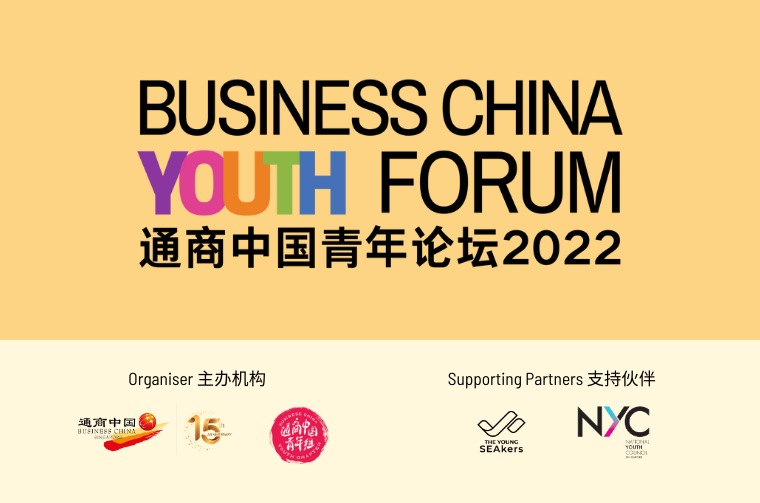Singapore, 7 Oct 2022 – The fourth edition of the Business China Youth Forum (BCYF) was successfully held at the Sands Expo and Convention Centre, with the theme this year being “Trailblazers in a Turbulent World: Navigating Uncertainties in ASEAN and China.” The forum aims to provide a platform for youths from the ASEAN region and China to exchange ideas, discuss pertinent issues of relevance to youths, and enhance their understanding of the latest developments in Singapore, China and ASEAN.
This year’s forum was conducted in a hybrid format and attracted more than 230 participants.
The Role of Youths Amidst Turbulent Times
In recent years, global political changes, rising inflation and the Russia-Ukraine war have kept the world in a state of turmoil. Against this backdrop, the forum’s Organising Committee chose three topics, focusing on the roles of youths in uncertain times, to encourage them to reflect on and prepare for the crises and opportunities arising from these trends.
In his opening address, Mr Chee Hong-Tat, Senior Minister of State for Finance and Transport, stressed that, Singapore youths must discover and showcase their unique value propositions to stay competitive, and stand out in this rapidly changing era. Mr Chee said: “If our ability and skill level are the same as them (the Chinese), then what they can learn from us will be negligible… I would like to encourage our youths to consider this: Think about how you and the Chinese youths can ‘seek common ground while reserving differences’ so as to provide value to them and benefit for yourself during your interaction with them?”
Opportunities from the Metaverse
The first panel discussion moderated by Business China Youth Chapter member Mr Ulric Teo, explored the opportunities of Web 3.0 technologies and Metaverse developments from the investment, arts as well as digital infrastructure perspectives, among others. Mr Calvin Neo, Head of Business Development of InterOpera, pointed out that Web 3.0 technologies built on the blockchain infrastructure, would revolutionise the way traditional finance and capital markets operate. This would also make it easier for the population to benefit from the technologies and build a system of financial inclusion.
Mr Yeang Cheng Ling, Senior Investment Strategist at DBS Bank, concurred with Mr Neo. He believed that Web 3.0 technologies not only provided large Internet companies with the opportunity to operate across borders virtually, but also enabled small and medium enterprises which rely on the traditional economy, to expand their online services, to generate income both online and offline, and grow their profits.
Mr Miao Shi Ming, founder of WABC Charity Foundation, shared that blockchain will play a significant role in the future; its decentralised nature has the potential to solve many public problems concerning social welfare, and art, as a bridge connecting people, can tap on these new technologies to enhance communication among the various social groups. In addition, Singapore’s geographical proximity to China – the world’s second-largest economy – and its commitment to transform itself into a smart nation, have created unique conditions for success and opportunities for the youth. Therefore, youths should make good use of the chances created by Web 3.0, move with the times, seize the opportunities and discover where they fit in, to realise their own value.
Youths have a great responsibility in realising environmental sustainability
During the warm-up session of the second panel discussion, a survey posed to participants revealed that 62% of youths were optimistic about their ability to achieve environmental sustainability. In response, Mr Tan Jun Han, the Deputy CEO of Sino-China Tianjin Eco-City Investment and Development Co Ltd, commented that, despite the positive attitude among youths, making environmental sustainability a long-term goal remained a big challenge. The authorities have a heavy responsibility to formulate appropriate development policies for their country, consider the sustainability of each policy, and persuade citizens to change and adopt an environmentally-friendly lifestyle.
Mr Mayur Singh, Co-founder of Green Collective, believes that youths are the key to overcoming these challenges. There are no barriers or prerequisites for youths to share their thoughts online on various environmental issues. He encouraged more young people to come forward and contribute in any way they can to the future of ecology and sustainable development.
The suggestion coincided with the thoughts of Mr Lester Leong, Co-founder of Gush. He noted that today’s youths are greatly affected by the critical challenges posed by climate change. However, they also have access to unprecedented opportunities: they can use online platforms to share and amplify their opinions and bring positive impacts to environmental sustainability regardless of their professions.
Similarly, keynote speaker Ms Vivian Lim, Lead Curator of TEDxSingapore, Co-founder of GEN and CEO of The Idea Co also outlined the power of communities to converge diverse perspectives. Communities can build a more inclusive space that will bring ideas into action, and help to overcome herculean tasks such as environmental sustainability.
In a post-forum interview, Haripriya, a first-year student from Singapore Polytechnic, said that the panel discussion helped her realise that youths could also make a difference in various environmental issues. Moving forward, she would choose to purchase products that are wrapped in eco-friendly packaging and try to reduce her use of plastic products as much as possible to do her part for the environment.
Technology as a key enabler in addressing food security challenges
The third session, led by Business China Youth Forum partner, The Young SEAkers, aimed to explore how youths could utilise technology to improve food security.
Due to the growing middle class and urbanisation, there has been a surge in demand for food in recent years. However, the food supply chain has been continuously disrupted by epidemics, wars and global warming, making food security an increasingly pressing issue. Against this background, agricultural technology has made major breakthroughs and have become rapidly industrialised.
On the use of AgriTech (Agricultural Technology) to help alleviate the problem of food security, Fisheroo’s Co-Founder and CEO, Mr Aaron Chua, gave the example of alternative proteins, which required lesser resources and shorter time to produce, and generated less pollutants.
In addition, while modern agricultural production models are highly dependent on antibiotics, “new food” produced by AgriTech does not require antibiotics. Therefore, Mr Shawn Keh, Managing Director of Haofood Singapore, believes that this will make the “new food” a healthier choice.
However, the implementation of new foods is not always smooth, and their popularisation is currently hampered by high prices. In response to the question of how to reduce the price of “new food” products to gain more consumer confidence, Mr Ibnur Rashad, Founder and Director of GUILD’s Ground Innovation Development Lab, shared a trend he has observed in China: more and more companies are using the Internet of Things (IoTs) to reduce the amount of water used to irrigate their crops, thereby lowering their operating costs and in turn, their selling prices, to achieve more sales.
This optimism was echoed by Co-Founder of Averplas Pte Ltd, Mr Alekz Leong. In his keynote address, he encouraged young people to overcome their limitations, spend time improving themselves and tap on the strengths of others to complement their weaknesses.
Ms Yu Ling, a student at the Beijing University of Chinese Medicine, said she was several of the discussions resonated with her. She had been doing her part to protect the planet by going vegan, for instance, and would be thinking about how she could do more.
The Organising Committee of the Business China Youth Forum noted that today’s youths are at a special place in time where the new and old eras are intertwined. While they encounter newfound opportunities, they also face many difficulties. Through the forum, the Organising Committee hoped that participants, as the pillars of society in future, would be better prepared to face the turbulent and unpredictable world ahead.
Business China and Business China Youth Chapter would like to extend our sincere appreciation to our partners – both organisations and individuals for your hard work and support.
About Business China Youth Chapter
BCYC is a voluntary group of youths that envisions to be the leading Singapore-based community. BCYC inspires youths to be China-savvy and facilitates their connections with China. Supported by Business China, BCYC has a vibrant calendar of activities which serve the needs of the BCYC community.
To join Business China Youth Chapter, please download the application form and email it to: bcyc@businesschina.org.sg.
This article is contributed by Tek Kai Zhen, Qin Zhidong and Narelle Koh Ning En with edits by Business China.
A shorter version of this article in Mandarin was published on Zaobao.

